|
|
|
Sort Order |
|
|
|
Items / Page
|
|
|
|
|
|
|
| Srl | Item |
| 1 |
ID:
149474


|
|
|
|
|
| Summary/Abstract |
The scientific study of war has largely ignored necessary conditions for war onset. Conflict scholars have previously identified alliances as a mechanism that brings about the initial expansion of war but have not examined whether it is a prerequisite for large wars. We argue that wars diffuse into multiparty wars only in the presence of alliances. In other words, in the absence of any alliance ties, war would not include more than two parties. We put forth a theoretical rationale for this relationship and conduct a series of tests on both dyadic and multiparty wars between 1816 and 2007. These tests provide support for our hypothesis, suggesting that alliances are a virtual necessary condition for multiparty wars: the larger the war, the more likely alliances are a necessary condition.
|
|
|
|
|
|
|
|
|
|
|
|
|
|
|
|
| 2 |
ID:
160488
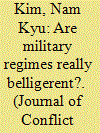

|
|
|
|
|
| Summary/Abstract |
Does military rule make a state more belligerent internationally? Several studies have recently established that military autocracies are more likely than civilian autocracies to deploy and use military force in pursuit of foreign policy objectives. I argue that military regimes are more likely to resort to military force because they are located in more hostile security environments, and not because they are inherently aggressive. First, I show that rule by military institution is more likely to emerge and exist in states facing external territorial threats. Second, by examining the relationship between military autocracies and conflict initiation, I find that once I control for states’ territorial threats, the statistical association between military regimes and conflict initiation disappears. Additionally, more evidence suggests that civilian dictatorships are more conflict-prone than their military counterparts when I account for unobserved dyad heterogeneity. The results are consistent across different measures of international conflict and authoritarian regimes.
|
|
|
|
|
|
|
|
|
|
|
|
|
|
|
|
| 3 |
ID:
177023
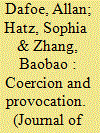

|
|
|
|
|
| Summary/Abstract |
Threats and force, by increasing expected costs, should reduce the target’s resolve. However, they often seem to increase resolve. We label this phenomenon provocation. We review instances of apparent provocation in interstate relations and offer a theory based on the logic of reputation and honor. We also consider alternative explanations: confounding or mis-imputation of resolve; revelation of information, character, or capabilities; or generalized sunk cost reasoning. Using survey experiments, we systematically evaluate whether provocation exists and what may account for it. We employ design-based causal inference techniques—a hypothetical natural experiment, a placebo treatment, and ruling out mediators—to evaluate our key hypotheses. We find strong evidence of provocation and suggestive evidence that it arises from considerations of honor, vengeance, and reputation. Our experimental design minimizes the risk that this result arises from our alternative explanations.
|
|
|
|
|
|
|
|
|
|
|
|
|
|
|
|
| 4 |
ID:
068977


|
|
|
| 5 |
ID:
159858
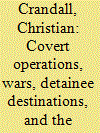

|
|
|
|
|
| Summary/Abstract |
We explore US covert forcible actions against democratic governments and their citizens and show that interdemocratic use of covert force is common and can be accommodated within the theory of democratic peace. Grounded in the Perceptual Theory of Legitimacy, we argue that democracies are constrained by public perceptions of their legitimacy from overtly aggressing against other democratic states. When democracies desire to aggress against their democratic counterparts, they will do so covertly. We test the assumptions of the theory and its implication with (1) laboratory studies of the conflation of democracy with ally status and (2) historical analyses of covert militarized actions and prisoner detention, which show that US forcible actions, when carried out against democracies and their citizens, are carried out clandestinely.
|
|
|
|
|
|
|
|
|
|
|
|
|
|
|
|
| 6 |
ID:
096120
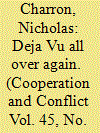

|
|
|
|
|
| Publication |
2010.
|
| Summary/Abstract |
Many in the media have depicted conflicts between the Western and Muslim worlds as a 'Clash of Civilizations' (CoC), and this has revived many of the questions surrounding the value of Samuel Huntington's CoC theory. Previous empirical tests have analysed his theory using low-level conflict at the interstate level or violent conflict at the subnational level. The former have demonstrated little or no empirical support for his theory, while the results in the latter group are mixed. This analysis adds to previous empirical studies in a number of ways. One, the empirical models test CoC exclusively in the post-Cold War era. Two, along with examining the civilizational determinants of military interstate disputes, as prior studies have done, I include models that focus exclusively on interstate wars, because Huntington frequently points out that a CoC between states will lead to violent political conflict. Finally, this study directly tests Huntington's civilizational 'fault lines' and Islamic 'bloody border' hypotheses. I include an extension and find that intra-civilizational conflict is relatively rare in the post-Cold War era. Contrary to earlier analyses, the data show strong empirical support for CoC, particularly when focusing on violent international conflict in the post-Cold War era, and the results are robust when testing the hypotheses with alternative data on international crises.
|
|
|
|
|
|
|
|
|
|
|
|
|
|
|
|
| 7 |
ID:
189007
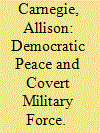

|
|
|
|
|
| Summary/Abstract |
How should we reconcile covert war with normative theories of the democratic peace? Proponents argue that these interventions are consistent with democratic peace theory, as leaders intervene covertly to escape backlash by a public that has internalized liberal norms. Yet we know little about public opinion regarding the covert use of force. Using a survey experiment, we find that respondents are more favorable towards covert interventions against democratic targets than our theories assume, and that even citizens who value transparency the most still wrestle with a trade-off between their normative commitments and the instrumental benefits they perceive covert actions to hold. Our results thus help to explain why American leaders have repeatedly chosen to conduct covert military operations against fellow democracies, and raise important questions about the scope conditions of normative theories of the democratic peace.
|
|
|
|
|
|
|
|
|
|
|
|
|
|
|
|
| 8 |
ID:
146161
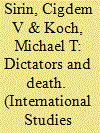

|
|
|
|
|
| Summary/Abstract |
Why are some authoritarian regimes so quick to surrender amid lower numbers of casualties while others prove willing to incur significant casualty counts to continue their war efforts? In this study, we explore the propensity of different authoritarian regime types to sustain casualties in interstate conflicts. We argue that authoritarian leaders with smaller winning coalitions find it easier to distribute the costs of militarized conflicts outside of those coalitions. This diminishes their sensitivity to casualties. Applying a theoretical model based on an inverse divide-the-dollar game (with respect to the distribution of public “bads”), we find that personalist regimes tend to sustain the highest number of casualties in militarized interstate disputes when compared to other autocracies. Our findings suggest that along with the audience cost abilities of an autocratic adversary, target states should also consider an autocratic regime's casualty sensitivity in deciding whether to reciprocate with military action.
|
|
|
|
|
|
|
|
|
|
|
|
|
|
|
|
| 9 |
ID:
193103


|
|
|
|
|
| Summary/Abstract |
This paper revisits the latest statistical evidence for the nuclear emboldenment thesis—nuclear-armed states are more likely to initiate military aggression than non-nuclear states—from (Bell and Miller 2015). If correct, their findings have important theoretical and policy implications regarding the effect of nuclear proliferation on international conflict. This paper shows, however, that Bell and Miller’s findings heavily rely on two important components of their statistical analysis: (1) using all state dyad observations, and (2) employing pooled regression models to analyze time-series-cross-sectional (TSCS) data. I argue that those components are based on questionable assumptions on heterogeneity in their dataset. Based on alternative strategies dealing with heterogeneity in dyadic data, my reanalysis shows that the emboldening effect of nuclear weapons is not as robust as originally claimed. Instead, I find the robust deterrent effect of nuclear weapons: nuclear-armed states are less likely to be targeted in military disputes. These findings highlight the need for careful application of quantitative methods to produce a more robust understanding of nuclear issues.
|
|
|
|
|
|
|
|
|
|
|
|
|
|
|
|
| 10 |
ID:
155187
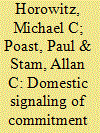

|
|
|
|
|
| Summary/Abstract |
We provide a new perspective on how domestic factors shape the prospects for international cooperation. Internal arms, specifically conscription, signal a willingness and suitability to be a dependable ally. Possessing ineffective military forces inhibits a state’s ability to assist prospective allies and renders a state less able to deter threats on its own. This exemplifies an instance where the trade-off between arms and allies does not apply. Using new data on the military recruitment policies of states since 1816, we find that adopting a conscription-based recruitment system in the previous five years makes a state more likely to form an alliance in the current year, even when accounting for a heightened threat environment.
|
|
|
|
|
|
|
|
|
|
|
|
|
|
|
|
| 11 |
ID:
164173
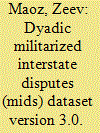

|
|
|
|
|
| Summary/Abstract |
We introduce the new, substantially updated, and revised version of the Dyadic Militarized Interstate Disputes (MIDs) dataset. We discuss the underlying logic of constructing dyadic MIDs and demonstrate that these operations generate significant differences between the actual occurrence and properties of MID dyads and those extracted from machine-generated programs such as EUGene, or from the MID participant dataset. We provide some descriptive measures of dyadic MIDs over the period of 1816 to 2010 and compare some of the key dyadic results on the correlates of MIDs using different datasets. We discuss the theoretical and empirical implications of our results.
|
|
|
|
|
|
|
|
|
|
|
|
|
|
|
|
| 12 |
ID:
159251
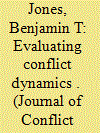

|
|
|
|
|
| Summary/Abstract |
Interest in processes has become increasingly pronounced in international conflict research in recent years, especially how these processes unfold across time “dynamics”. We focus in particular on “stage conceptions” of dynamics: processes that unfold over a series of sequential, and possibly recurrent, stages. We suggest that stage conceptions have two key properties: plurisectality and conditional covariate effects. We propose a novel econometric application to quantitatively assess claims regarding stage conceptions of dynamics: survival modeling. Specifically, we use multistate models to examine how a process evolves through its individual stages, and also whether covariate effects differ across these stages. We use Huth and Allee’s territorial dispute data to demonstrate the importance of conceptualizing conflict as a dynamic process, as well as empirically modeling it as such. We show democracy has different effects on dispute resolution, depending on the dispute’s stage, but that these different effects disappear after time passes.
|
|
|
|
|
|
|
|
|
|
|
|
|
|
|
|
| 13 |
ID:
148324
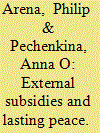

|
|
|
|
|
| Summary/Abstract |
Third parties are thought to face a trade-off in that those actions most likely to bring peace in the short run appear least likely to ensure its long-run stability. Yet the trade-off between conflict management and conflict resolution may be overstated. Analyzing an iterated three-player bargaining model with both information and commitment problems, we first demonstrate two conditions under which third parties may produce lasting peace through conditional subsidies, even without addressing underlying informational or commitment problems. Second, we illustrate this possibility by analyzing the impact of US foreign aid on patterns of conflict and peace between Israel and her neighbors. Our analysis indicates that the termination of the rivalry between Israel and Egypt was most likely not brought about by the Camp David accords or peacekeeping operations, but by sustained foreign aid provision. We discuss the implications for both this conflict and conflict management more broadly.
|
|
|
|
|
|
|
|
|
|
|
|
|
|
|
|
| 14 |
ID:
094691
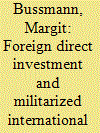

|
|
|
|
|
| Publication |
2010.
|
| Summary/Abstract |
Liberals claim that countries avoid conflict in order not to disrupt economically beneficial exchange. The statement that economic integration reduces the likelihood of conflict is largely based on the effects of trade. A similar rationale can be applied to economic interdependence in the form of international capital exchange. A state is expected to avoid political risk, especially severe forms such as militarized disputes, in order not to deter investors. This study tests, on the dyadic and monadic levels of analyses, whether the liberal peace proposition holds when economic integration is operationalized as foreign direct investment (FDI) stocks, inflows, and outflows. The results for the years 1980-2000 indicate that inflows and stock of foreign investment reduce the risk of an outbreak of a fatal dispute, regardless of whether they are tested in a single equation or a simultaneous equation model. Thus, reverse causality does not bias the pacifying effect of foreign investment inflows and stock. The results also support the underlying notion of the commercial peace that militarized conflicts inhibit foreign investment. The onset of a fatal conflict reduces FDI inflows, and, if tested in a two-stage instrumental variable approach, FDI stock, the most complete measure of economic integration through foreign investment. Accounting for endogeneity seems particularly important when analyzing the link between the onset of fatal disputes and the outflow of FDI.
|
|
|
|
|
|
|
|
|
|
|
|
|
|
|
|
| 15 |
ID:
154743
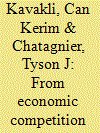

|
|
|
|
|
| Summary/Abstract |
The vast majority of the extant literature on trade and conflict focuses on bilateral trade to determine whether commerce has a pacifying effect upon pairs of states. We argue that this focus neglects a critical role of international trade: creating tension between states that sell similar goods to the global market. We consider this role explicitly and operationalize its effects empirically. Using commodity-level trade data from 1962 to 2000, we show that countries that produce and sell similar goods are generally more likely to fight, even after we take into account their bilateral trade ties and institutional membership in the global economic system. Our findings are robust to numerous alternative specifications and suggest a strong relationship between economic competition in the global market and military conflict between states.
|
|
|
|
|
|
|
|
|
|
|
|
|
|
|
|
| 16 |
ID:
186819


|
|
|
|
|
| Summary/Abstract |
Because existing issue classification schemes omit prominent issues (e.g., domestic armed conflict) or contain significant within-category heterogeneity, theorizing about the role of issues in international conflict processes has stagnated. Our project jump-starts it again, by independently—and systematically—reconceptualizing and gathering data on five issues connected to dyadic militarized interstate disputes (MIDs) during the period 1900–2010: land (borders), maritime (borders), islands, civil conflict, and coups. After conceptually introducing these issues and embedding them within a larger framework, we describe and apply our MID-Issue data. These efforts show that (i) the MID dataset’s issue classification scheme does not systematically capture our issues, (ii) events in 37.58% of dyadic MIDs connect to domestic armed conflict—a prevalence not on the field’s radar, (iii) some factors promote issue-based international conflict, but only via indirect channels, and (iv) significant value even derives from a further conceptualization of “territorial issues” (broadly defined).
|
|
|
|
|
|
|
|
|
|
|
|
|
|
|
|
| 17 |
ID:
093089
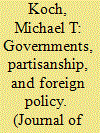

|
|
|
|
|
| Publication |
2009.
|
| Summary/Abstract |
Do variations in partisanship and political outcomes among democratic states affect the duration of militarized interstate disputes? To answer this question, the author develops a model of partisan competition derived from the government failure literature. The author argues factors associated with government failure determine the ability of governments to contend with the domestic political costs of militarized disputes, specifically the duration of those disputes. The author tests his expectations using hazard analysis on a dataset of 20 democratic governments and militarized disputes between 1945 and 1992. The results suggest the outcome of party competition in the form of a government's sensitivity to the potential political costs of conflict is an important part of the conflict process. The author concludes that differences in domestic political outcomes influence the duration of militarized interstate disputes. Governments that are politically more secure in their tenure engage in longer disputes. Alternatively, governments that are more vulnerable have significantly shorter disputes. In addition, because government partisanship contributes to vulnerability, it also affects dispute duration, with governments of the left engaging in shorter disputes, while governments of the right fight longer disputes.
|
|
|
|
|
|
|
|
|
|
|
|
|
|
|
|
| 18 |
ID:
158848


|
|
|
|
|
| Summary/Abstract |
According to conventional wisdom, strategic natural resources like oil are harmful to international peace. Nonetheless, there is little comparative work on the link between resources and interstate conflicts. Analyzing the impact of oil on militarized interstate disputes on the dyadic level of analysis for the period from 1946 to 2001, this paper shows that oil in fact influences the conflict potential between countries. Results of logistic regressions suggest that absolute oil abundance as well as oil dependence increase the risk of dispute involvement. We find that in particular oil production, oil reserves, oil dependence, and oil exports are associated with a higher risk of initiating conflict while countries enjoying large oil reserves are more frequently the target of military actions. Furthermore, our analysis indicates that the presence of large oil deposits also increase the intensity of international disputes. Relative measures of oil abundance such as per capita oil production, in contrast, do not affect countries’ dispute proneness. Increased militarization, the internationalization of intrastate violence, the indulgence of an oil-dependent world community and so-called “classical resource wars”—rather than domestic political mechanisms inherent to the rentier state—are likely to explain our findings.
|
|
|
|
|
|
|
|
|
|
|
|
|
|
|
|
| 19 |
ID:
147698


|
|
|
|
|
| Summary/Abstract |
In canonical accounts of war, conflict outcomes are inherently uncertain. Contesting literatures posit that this uncertainty, arising from stochastic elements of the war-fighting process, may induce conflict due to greater risks of miscalculation or foster peace by breeding caution. We theorize that states, on average, exhibit prudence when confronting greater uncertainty. Despite its conceptual importance, extant proxies for uncertainty at various levels of analysis—such as polarity, balance of power, system concentration, and dyadic relative capabilities—are imprecise and theoretically inappropriate indicators. To overcome this shortcoming, we theorize the conditions that elevate the magnitude of uncertainty over conflict outcomes and introduce a novel measure that captures this uncertainty within any k-state system. Through extensive empirical analysis, we confirm uncertainty’s pacifying effect and show how this effect operates at different levels of analysis
|
|
|
|
|
|
|
|
|
|
|
|
|
|
|
|
| 20 |
ID:
154738
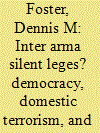

|
|
|
|
|
| Summary/Abstract |
This article develops expectations about the use of military force by democracies facing domestic terrorism. Due to the necessity of balancing effective counterterrorism with liberal acceptability, domestic terrorism typically represents a significant but nonexistential threat to democracies that is ineradicable via repression; as such, it is likely to generate appreciable diversionary incentives. Moreover, the use of force abroad, coupled with counterterrorist strategies that seek to safeguard democratic legitimacy, allows leaders to provide benefits both to citizens who seek retribution against terrorists and to those who value the preservation of liberty. Tests of the correlates of dispute initiation across all democracies, 1970–2000, provide support for this hypothesis. Further analyses reveal that diversion from domestic terrorism is most likely by democratic governments with relatively greater diversionary capacity and with lesser repressive capacity and incentive.
|
|
|
|
|
|
|
|
|
|
|
|
|
|
|
|
|
|
|
|
|